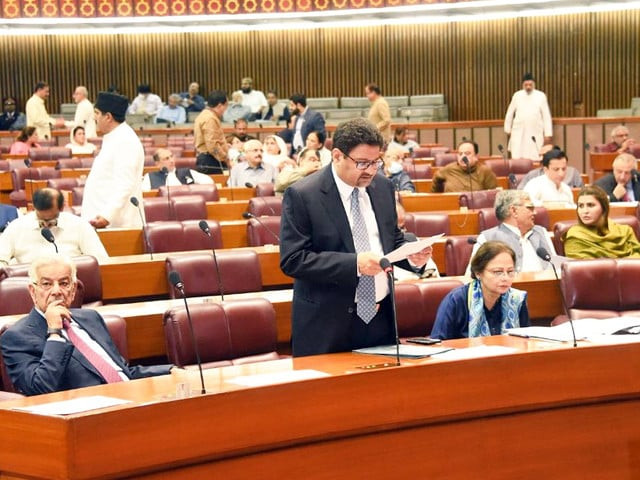NA stamps IMF-dictated Rs9.6tr federal outlay
Govt backs away from its promise to levy super tax for only one year

The National Assembly on Wednesday approved the Rs9.6 trillion federal budget for fiscal year 2022-23 and also passed the Finance Act to give effect to over Rs1 trillion new tax measures, as the government backed away from its promise to levy super tax for only one year.
With the approval of the new budget, the income tax rate for the highest salaried person is now 39% and for the companies, except 13 sectors, it is 33%. The budget has this time put burden on almost all segments of the society, except the stock market players who went away with Rs8 billion in tax relief despite challenging economic times.
Over Rs1 trillion tax measures have been taken to satisfy the International Monetary Fund (IMF) that demanded primary budget surplus in the next fiscal year. But some measures like increase in petroleum levy rates would stoke inflation that the finance ministry on Wednesday projected to skyrocket to 15.5% in June.
From today's session #NAatWork #NASession #budget2022_23 @RPAPPP @AishaGPasha @AheerJavaria @mjdawar #budgetsession #budget22_23 pic.twitter.com/Nxa1rVSkht
— National Assembly of Pakistan🇵🇰 (@NAofPakistan) June 29, 2022
The government slapped 1% to 4% super tax on companies for an unlimited period. Prime Minister Shehbaz Sharif had promised that the super tax would be imposed for only one year but he had now backtracked from the promise. But 10% super tax remains, for the time being, for one year.
The National Assembly also amended the Chairman and Speaker (Salaries, Allowances and Privileges) Act 1975 to empower the finance committee of the Senate or National Assembly to grant the chairman or the speaker including past custodians of parliament the “additional privileges as it may deem fit from time to time”.
Under the existing law, such additional privileges are granted by the federal government to the Senate chairman and the National Assembly speaker. The new budget will come into effect from Friday.
Read ‘Broad agreement’ reached with IMF to end uncertainty
The passage of the budget for the fiscal year 2022-2023 is expected to pave the way for striking a staff-level agreement with the IMF for revival of the stalled programme. However, the IMF has set new conditions that the government will have to implement from now till December to remain in the programme.
Finance Minister Miftah Ismail on Wednesday said that the government would give its response to the IMF on the draft MEFP document in a couple of days and some of the proposed conditions might not be accepted.
The IMF asked Pakistan to end the government’s role in setting the fuel prices by December 2022. The global lender asked that the fuel prices be deregulated and automatically adjusted to recover the actual cost of buying from the consumers. The IMF also set the condition that Pakistan should review its anti-corruption laws.
The IMF set prior action of notifying over Rs3.50 per unit increase in electricity prices from July. Pakistan committed to the IMF to impose Rs10 per litre petroleum levy on petrol and diesel from July 1. The IMF asked Pakistan to seek and communicate the cabinet’s nod to further increase the petroleum levy by Rs10 per litre on petrol and Rs5 on diesel from August 1.
The National Assembly approved an increase in the per litre petroleum levy on all products to Rs50 –up from Rs30 per litre. This will give an additional revenue of over Rs400 billion to the government. Based on the new rate, the petroleum levy target has now been set at a record Rs855 billion –up from Rs750 billion proposed on June 10.
The government also made adjustments in expenditures and the total size of the budget is now Rs9.6 trillion –higher than proposed on June 10. The defence budget has been further increased to Rs1.567 trillion –an increase of 4.1% or Rs154 billion over the last year’s original allocation. Compared with June 10, the defence budget has been increased by another Rs40 billion.
The cost of pensions has been increased to Rs609 billion –up from Rs530 billion three weeks ago.
#NAatWork #NASession #budget2022_23 #budgetsession #budget22_23 @MiftahIsmail @DrFMirza @RVankwani pic.twitter.com/gXTAB8D5YE
— National Assembly of Pakistan🇵🇰 (@NAofPakistan) June 29, 2022
Interest payments now account for 41% of the total budget and Rs3.950 trillion has been earmarked for the next fiscal year – the single largest expense in the budget. After paying Rs4.37 trillion to the provinces as part of the National Finance Commission (NFC) Award, net revenue of the federal government would be Rs5.03 trillion.
The primary budget surplus target has been set at Rs152 billion on back of Rs750 billion provincial cash surpluses.
The government has also rectified mistakes in the budget documents and included loans from the IMF and China in the external receipts that the country will get in the next fiscal year.
The approval of the Finance Act 2022, presented by the Minister of State for Finance Dr Aisha Ghous Pasha in the house, will give effect to another Rs608 billion new tax measures.
Dr Pasha said that 80% of the FBR’s new taxes were direct in nature. The FBR’s tax target has been approved at Rs7.470 trillion and 41% of it or Rs3.04 trillion is targeted to be collected through direct measures.
While deviating from the commitment to impose the super tax only for one year, the government has imposed the tax for tax year “2022 and onwards”.
On annual individual income ranging from Rs150 million to Rs300 million, there will be an additional 1% to 4% poverty alleviation tax. For companies having income in this bracket, there will be up to 4% super tax.
Read more Traders fear economy will crash due to super tax
The sectors that have been targeted with 10% super tax are airlines, automobiles, beverages, cement, chemicals, cigarette and tobacco, fertiliser, iron and steel, LNG terminal, oil marketing, oil refining, petroleum and gas exploration and production, pharmaceuticals, sugar and textiles. The prime minister on Tuesday said that the corporate sector largely accepted the super tax. The effective tax rate for these sectors will be 39% for the fiscal year 2021-22, ending today.
Duty on the import of equipment for the film industry, including projectors, loud speakers and 3D glasses, was also abolished in the final budget.
An amendment to take back the relief provided to the salaried class was also approved. The government has passed on Rs80 billion burden on the salaried class compared with the June 10 proposed budget.
Under the new rates, no tax will be imposed on those earning less than Rs600,000 per year.
The government set a 2.5% income tax rate on up to Rs100,000 monthly income as against nil tax proposed on June 10. This is still half of the rate the salaried class paid in the outgoing fiscal year.
It introduced a 12.5% income tax rate for people earning up to Rs200,000 a month –which is 78% higher than that proposed on June 10. For the fourth slab carrying people of up to Rs300,000 monthly income, the government now set 20% income tax rate as against 12.5% proposed on June 10 -- an additional burden of 60% in comparison with the three-week old rate. The existing tax rate for this income group was 17.5%.
On a monthly income of Rs500,000 -- the fifth slab -- the government proposed 25% income tax as against the three-week old rate of 17.5%. For people earning over Rs1 million a month, the government introduced a 32.5% rate – up from 22.5% three weeks ago.
For those who earn over Rs1 million a month, the government now slapped a 35% income tax rate -- up from the three-week old rate of 32.5%. At present, the people earning over Rs1 million a month to Rs2.5 million were paying 27.5% income tax rate.
#NAatWork #NASession #budget2022_23 #budgetsession #budget22_23 @MiftahIsmail @WajihaQmr @MaulanaChitrali pic.twitter.com/PljY4kg1Az
— National Assembly of Pakistan🇵🇰 (@NAofPakistan) June 29, 2022
Through the Finance Act 2022, the government is allowed to carry forward the losses against turnover tax for three years, accepting a major demand of the business community. In the budget, the government had withdrawn this facility to collect Rs40 billion additional taxes a year.
The government has given income tax exemption to Burhani Qarzan Hasnan Trust, Saifee Hospital Karachi and Saifiyah Girls Taalim Trust.
The government relaxed the disclosure condition about the ultimate owners of Pakistani companies to ward off pressure from the wealthiest people, who were reluctant to fully reveal their assets and want the continuation of secrecy. Against the proposed requirement that companies would have to disclose the names of their ultimate owners who directly or indirectly control at least 10% shares or voting rights, the government lowered the requirement to 25% of the shareholding.
The government changed the definition of resident Pakistani to include all those people in the tax net who did not stay in any foreign country for more than six months. “Being a citizen of Pakistan is not present in any other country for more than 182 days during the tax year or who is not a resident taxpayer of any other country,” according to the bill.
The government also reduced the proposed 2% capital value tax (CVT) on vehicles besides omitting the taxable limit of Rs5 million value of the car. It proposed 1% CVT on all cars of 1,300cc and above.
The government further amended the clause introduced on June 10 to collect tax on the deemed income from properties. The government would treat the immovable assets as capital assets to avoid legal complications.
The government restored the income tax exemption on contribution to the pension funds for both companies and individuals. The government extended the tax credit to the charitable organisations for one year, as against the earlier proposal of two years, covered under Section 100C.
The government also imposed 1% GST on manufacture or import of substances registered as drugs under the Drugs Act, 1976 and also 1% on active pharmaceutical ingredients, excluding excipients, for manufacture of drugs registered under the Drugs Act, 1976 or raw materials for the basic manufacture of pharmaceutical active ingredients. Earlier, these sectors had been brought in zero-rating regime, which resulted in the blockage of Rs40 billion refunds.
The government excluded jewellers doing business in less than 300 square feet shop from standard sales tax and they will now be charged at Rs40,000 fixed tax to cover their all tax-related liabilities.
It introduced 3% tax on sale of jewellery, 12.5% on sale of electric vehicles in CBU condition of 50kv battery or below and 1% on electric vehicle transport buses of 25 seats or more in CBU form.
It fixed sales tax rates of Rs3,000 to Rs10,000 for those retailers who file their returns and the rates will be doubled for those who are non-filers.
The government restored income tax exemption for fertiliser and on oil cake and solid residue has also been restored.



















COMMENTS
Comments are moderated and generally will be posted if they are on-topic and not abusive.
For more information, please see our Comments FAQ